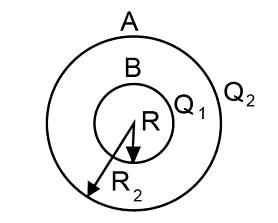Assertion & Reason Test: Electrostatic Potential & Capacitance - 1 - Grade 12 MCQ
15 Questions MCQ Test - Assertion & Reason Test: Electrostatic Potential & Capacitance - 1
Directions: In the following questions, A statement of Assertion (A) is followed by a statement of Reason (R). Mark the correct choice as.
Assertion (A): Electric field is always normal to equipotential surfaces and along the direction of decreasing order of potential.
Reason (R): Negative gradient of electric potential is electric field.
Directions: In the following questions, A statement of Assertion (A) is followed by a statement of Reason (R). Mark the correct choice as.
Assertion (A): Work done in moving a charge between any two points in a uniform electric field is independent of the path followed by the charge between these two points.
Reason (R): Electrostatic forces are nonconservative.
Directions: In the following questions, A statement of Assertion (A) is followed by a statement of Reason (R). Mark the correct choice as.
Assertion (A): When the distance between the parallel plates of a parallel plate capacitor is halved and the dielectric constant of the dielectric used is made three times, then the capacitance becomes three times.
Reason (R): Capacitance does not depend on the nature of material.
Directions: In the following questions, A statement of Assertion (A) is followed by a statement of Reason (R). Mark the correct choice as.
Assertion (A): Capacity of a conductor is independent of the amount of charge on it.
Reason (R): Capacitance depends on the dielectric constant of the surrounding medium, shape and size of the conductor.
Directions: These questions consist of two statements, each printed as Assertion and Reason. While answering these questions, you are required to choose any one of the following four responses.
Assertion : If the distance between parallel plates of a capacitor is halved and dielectric constant is three times, then the capacitance becomes 6 times.
Reason : Capacity of the capacitor does not depend upon the nature of the material.
Directions: These questions consist of two statements, each printed as Assertion and Reason. While answering these questions, you are required to choose any one of the following four responses.
Assertion : The total charge stored in a capacitor is zero.
Reason : The field just outside the capacitor is σ/ε0. (σ is the charge density).
Directions: These questions consist of two statements, each printed as Assertion and Reason. While answering these questions, you are required to choose any one of the following four responses.
Assertion : Two concentric charged shells are given. The potential difference between the shells depends on the charge of the inner shell.
Reason : Potential due to charge of outer shell remains same at every point inside the sphere.

Directions: These questions consist of two statements, each printed as Assertion and Reason. While answering these questions, you are required to choose any one of the following four responses.
Assertion: The potential difference between any two points in an electric field depends only on initial and final position.
Reason: Electric field is a conservative field so the work done per unit positive charge does not depend on the path followed.
Directions: These questions consist of two statements, each printed as Assertion and Reason. While answering these questions, you are required to choose any one of the following four responses.
Assertion : Electric field is discontinuous across the surface of a spherical charged shell.
Reason : Electric potential is continuous across the surface of a spherical charged shell.
Directions: These questions consist of two statements, each printed as Assertion and Reason. While answering these questions, you are required to choose any one of the following four responses.
Assertion : Two adjacent conductors of unequal dimensions, carrying the same positive charge have a potential difference between them.
Reason : The potential of a conductor depends upon the charge given to it.
Directions: These questions consist of two statements, each printed as Assertion and Reason. While answering these questions, you are required to choose any one of the following four responses.
Assertion : For a non-uniformly charged thin circular ring with net charge is zero, the electric field at any point on the axis of the ring is zero.
Reason : For a non-uniformly charged thin circular ring with net charge zero, the electric potential at each point on the axis of the ring is zero.
Directions: These questions consist of two statements, each printed as Assertion and Reason. While answering these questions, you are required to choose any one of the following four responses.
Assertion : Polar molecules have permanent dipole moments.
Reason : In polar molecules, the centres of positive and negative charges coincide even when there is no external field.
Directions: These questions consist of two statements, each printed as Assertion and Reason. While answering these questions, you are required to choose any one of the following four responses.
Assertion : In the absence of an external electric field, the dipole moment per unit volume of a polar dielectric is zero.
Reason : The dipoles of a polar dielectric are randomly oriented.
Directions: These questions consist of two statements, each printed as Assertion and Reason. While answering these questions, you are required to choose any one of the following four responses.
Assertion : Electric energy resides out of the spherical isolated conductor.
Reason : The electric field at any point inside the conductor is zero.
Directions: These questions consist of two statements, each printed as Assertion and Reason. While answering these questions, you are required to choose any one of the following four responses.
Assertion: Two equipotential surfaces can be orthogonal.
Reason: Electric field lines are normal to the equipotential surface.

























